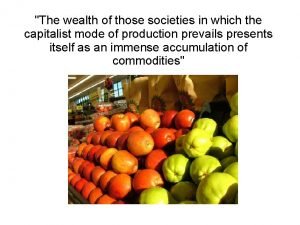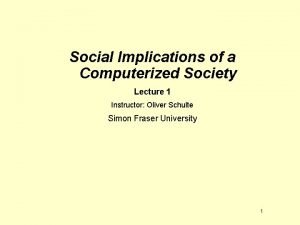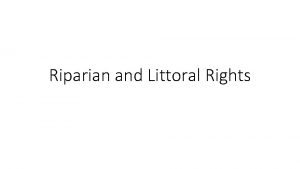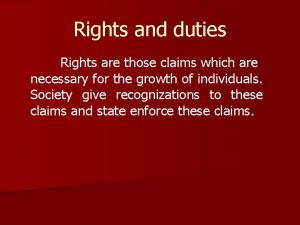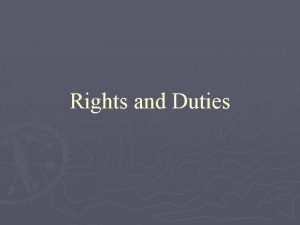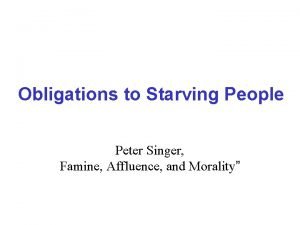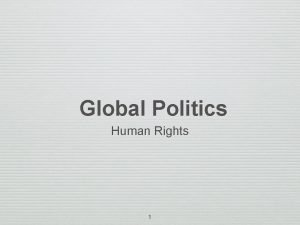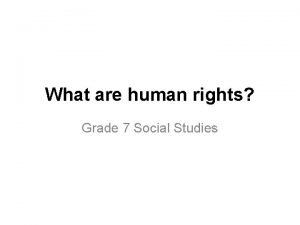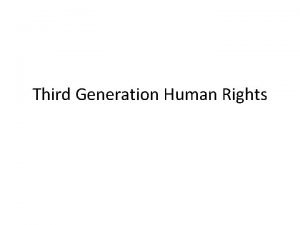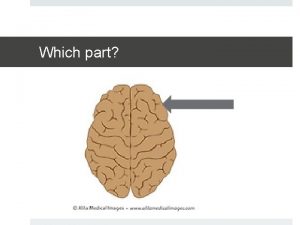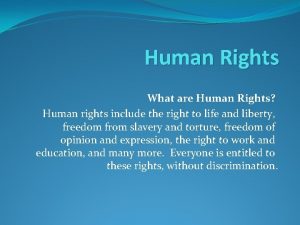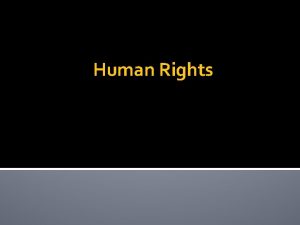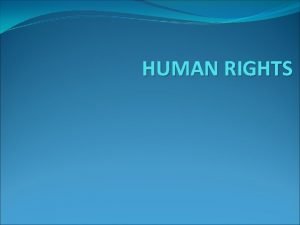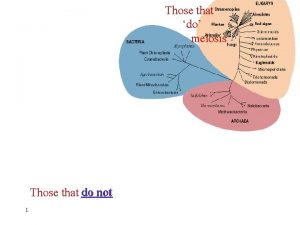Human Rights Human rights are those rights which















- Slides: 15

Human Rights • Human rights are those rights which are inherent in human nature and without which human beings cannot live with dignity as human beings. • Such rights are vested in people and are not granted by government. • Democracy, free and fair media, independent and impartial judiciary facilitate the implementation of these rights. • But in a society where people are denied economic, physical and social resources, they become powerless and are consequently marginalized by the social, economic and political systems. • Scheduled Castes and Scheduled Tribes are two such marginalized groups who constitute the most vulnerable sections of society.

Violation of Rights of Dalits (SC) • It is alarming that the occurrence of such exploitation and humiliation goes on unabated despite special provisions in the Indian constitution for their protection and claims of affirmative actions having been taken by the state. • As per the constitutional provisions, a number of measuresboth protective as well as developmental- have been initiated by the government. i. Art. 17 of the constitution of India has abolished ‘untouchability’ and its practice in any form has been strictly forbidden. ii. Later, the Parliament enacted Untouchability (offences) Act, 1955, to give effect to Art. 17. iii. So as to make it more stringent , the Act was amended in 1976, and was renamed as Protection of Civil Rights Act, 1955.

Inadequacy of the Act to Provide Protection • But the Protection of Civil Rights Act along with the normal provisions of the Indian Penal Code, had been found to be inadequate in providing safeguards to the SCs/STs against several crimes. • Thus yet another Act, known as the Scheduled Castes and Scheduled Tribes (Prevention of Atrocities) Act, 1989, was also passed by the Indian Parliament. But these legal instruments not withstanding as per the report of the Ministry of Social Justice and Empowerment crimes committed against persons belonging to Scheduled Castes community were on a rise.

Protective Discrimination Not Enough • The assumption that protective discrimination aims at solving all the problems faced by Dalits is problematic. • Besides, not only the economic problems, but also the non-economic problems are important because untouchability is not merely an economic problem. • It would be too simplistic to believe that the solution of economic problems would lead to the solution of all other problems. • The complexities of a caste-ridden society like India’s are such that untouchability still remains the most important and the central problem facing the Dalits. Thus, before devising the remedial measures, it is necessary to understand the causes of untouchability and the nature and extent of its prevalence.

Practice of Untouchability in Two Primary Spheres • I. P. Desai (1976), examines the practice of untouchability, primarily in two spheres: i. The private spheres, which is a customgoverned sphere; and ii. The public sphere, which is a law-governed sphere. As per Desai’s study untouchability is strong in the religious and domestic spheres whereas it is less strong and weakening in the occupational sphere. However, it is not a problem in the public sphere.

Promotional or Developmental Measures • Apart from the above-mentioned protective measures there are provisions of reservations and representation to members of SCs and STs in order to improve their access and participation in the economic, social and political spheres, which come under the category of promotional or developmental measures. • But it is worthwhile to note here that discrimination in private sphere- social or economic- is not covered by such measures. • The condition of the Dalit community is still far from satisfactory. Be it private employment, school dropout rates, literacy or health indicators, access to higher education or even government jobs, Dalits are most disadvantageously placed.

Discriminated Despite Enormous Contribution • In view of Dalit’s enormous contribution to society in terms of labour, art and culture their share of the country’s resources and riches is disproportionately lower. • They are mainly landless and where they own land at all, it is marginal and usually of low quality, as well as nonirrigated. • An overwhelming majority (nearly 77%) of the Dalit workforce is in the primary or agricultural sector of the economy. • Due to higher incidence of wage labour associated with high rate of under-employment, Dalits suffer from low income and consumption and a resultant greater level of poverty. They work as agricultural labourers, share croppers and self-cultivators and do not get work through out the year.

Globalization and Dalits • The land rights movement of Dalits has not succeeded largely because they have not been able to emerge with a perspective of social change in the basic structure of the society. • The lack of successful land reforms, due to a number of factors such as absence of political will, bureaucratic commitment, loopholes in the law, tremendous manipulative power of the landed class, lack of organization among the poor and excessive interference of courts, has been largely responsible for this. • The life values sustained through community life and love are constantly diffusing and substituted with competition under the impact of globalization and marketization.

Globalization and Dalits (Contd. ) • Land is much more than a productive asset as people are emotionally attached with land in many ways. In a number of cases, it is the symbol of their freedom. • For some , land is the image of their fight against the upper castes while it represents the mark of reiterating the lost identity for some others. Land is also the icon of selfdetermination, co-existence and community feeling. • As against all this land is simply a commodity to the corporate sector and agents of ‘development’, which can be purchased and sold for commercial purposes. • The common man is asked to make sacrifices under some pretext or other. What is more shocking today is that the powerful elites or interest groups are doing it through the connivance and collusion of the state administration.

Rights-based Approach not a Welfarebased • ‘Development’ of the poor and poverty ‘eradication’ has become the catchword in the market with claims from all circles- the government, multinationals, industrialists etc. -that they strive for development. • But ‘development’ is one of the most hated terms among the common man today. • Justice A. S. Anand, the Chairperson of the National Human Rights Commission (NHRC), in a recent speech, called upon the government to adopt a rights based approach and not a welfare based one in addressing the condition of the people belonging to the SCs. He mainly blamed the society’s ‘Indifference’ and ‘refusal to change its mindset’.

Foundations of Reservations Shaken by Economic Reforms • The Economic Reforms and the consequent measures of privatization have already shaken the very foundations of Reservations. The welfare nature of the state is being questioned now, India is moving towards a minimalist government. • With the carrying out of the Structural Adjustment Programme of the World Bank, denationalization of the Public Sector and privatization have come in a big way. • Thus, reservations have been wiped off through such policies. Freezing of the grants to many institutions and stagnation of the expenditure on education are some other consequences of the economic reforms. • What one sees today is the free market ethos, which has entered the educational sphere in a big way. Commercialization of education has become a reality today.

Commercialization of Education • Even in small towns, commercial institutions can be seen offering specialized education. It is to be noted that the product prices of such institutions are not only guided by the demand supply consideration in their market segment but also are manipulated by their promotional strategies. • Many foreign universities are invading the educational spheres through ‘strategic alliances’ with commercial agencies at hefty dollar equivalent prices. • Faced with a sudden fund crunch the nation’s elite institutions like IIMs and IITs had to raise their fee structure and other prices many fold. Education in such institutions, which was already beyond the reach of Dalits or, for that matter, any marginalized section, would now be absolutely unaffordable when these institutions eventually turn self financing and bench mark their prices against their international counterparts. • Shrinking of job opportunities has already resulted in a cutthroat competition in the job market, which, in turn, has further sharpened the polarization between the elite and commoner.

Legal Measures Alone Not Enough • Legal measures alone cannot ensure protection of human rights as economic, social, cultural and religious notions often make the enforcement and practice of human rights difficult. • Unless inequalities embedded in the economic, social and cultural structure of the society are addressed to, the legal measures will not be of much help in protecting the human rights of Dalits. For this, it is necessary to understand the three inter-related elements of Hindu social order. i. Predetermination of social, religious and economic rights of each caste based on birth; ii. The unequal hierarchical (graded) division of these rights among the castes; and iii. Provision of strong social, religious and economic ostracism supported by social and religious ideology to maintain the order.

Stigma of Pollution: the Root Cause of Dalit Backwardness • Dalit backwardness is not solely a matter of poverty. It is also due to the stigma of pollution, which is attached to the caste or community as a whole. • Attitudes to pollution reappear in the form of social prejudices, which weigh heavily against the Dalits in most competitive situations (Beteille, 1981). • The problems of Dalits are both socio-cultural, as well as economic. Unlike the poor of many other castes, Dalits suffer a double discrimination, for being poor and for being untouchables.

Constitutional Provisions are not Antipoverty Programmes • The constitutional provisions such as i) political reservations; ii) reservations of seats in professional educational institutions; and iii) reservations in government jobs are not anti-poverty programmes. • Due to the poverty of a vast majority of Dalits, only a small section, particularly from upper strata, can pursue studies and thus benefit from the policy of reservations. • It is again due to poverty they are unable to benefit from the policy of reservations in the political spheres as contesting elections is very expensive. • Thus, protective discrimination does not deal with abject poverty and untouchability.
 Insidan region jh
Insidan region jh Forgetting those things that are behind me
Forgetting those things that are behind me Difference between organized and unorganized drugs
Difference between organized and unorganized drugs The wealth of those societies in which the capitalist
The wealth of those societies in which the capitalist What grade of seafood is marked with a stamp
What grade of seafood is marked with a stamp Positive vs negative rights
Positive vs negative rights Riparian rights
Riparian rights Characteristics of rights
Characteristics of rights Legal rights and moral rights
Legal rights and moral rights What are negative rights
What are negative rights Negative rights
Negative rights Negative right
Negative right Positive rights and negative rights
Positive rights and negative rights What is rights in social studies
What is rights in social studies What evidence do you see of the dictator being militaristic
What evidence do you see of the dictator being militaristic 1st generation rights
1st generation rights



